#mirandela
Explore tagged Tumblr posts
Text

8-bit game set in Mirandela Portugal
6 notes
·
View notes
Text
A melhor alheira é na airfryer, tão simples e fácil de fazer
1 note
·
View note
Text
Mirandela Feinkost
Frisches Gemüse, das ist unsere Überzeugung, unsere Herausforderung und es ist unsere Rohware.Östlich von München grillen, kochen und braten wir frische Gemüseconvenience aus erntefrischem Gemüse.Für die Kunst, aus Gemüse gesunde und leckere Speisen, feine Beilagen oder schmackhafte Antipasti herzustellen, ist die Frische - für uns - unverzichtbar.
https://renovation.directory/directory/listing/mirandela-feinkost
Project Name mirandela Feinkost Address Am Anger 3, 85598 Vaterstetten, Germany Country Germany MaIl ID [email protected] Phone No. 49 8106 - 33756 Website https://www.mirandela.de/
0 notes
Text

0 notes
Text

Photo Raúl Silva Pereira.
Ponte Velha Mirandela - Portugal.
10 notes
·
View notes
Text
Portugal, day 1
It's time for another European travelogue! This time I am spending a week in Portugal with my friend Michele, who actually speaks Portuguese, rendering this a very different experience from my last visit to Lisbon. We'll be spending a couple of days in Lisbon, then heading north to Viseu for festivities around the opening of a new museum, then back to Lisbon for a day before heading home.
We left Chicago on a 6pm flight last night and arrived in Lisbon at 8am. Our hotel rooms weren't ready yet, so we decided to cross a tourist destination off our list right away and headed to St. George's castle.


The castle is located on top of a hill and has lovely views of the city. There weren't any informational plaques about anything so I didn't really learn much other than "Castle old. King built castle. Moors? Maybe involved?" They did have one of those "identifying landmarks in the panoramic view" displays, which was located... behind an enormous shrub.

The castle was also home to a lot of peacocks, many of which were "piebald peacocks," meaning they had large white patches. I thought maybe this was vitiligo, but apparently people deliberately breed peacocks this way? Anyway, the peacocks and peahens also had babies of various ages with them, which was pretty cute.


After we were done at the castle, our hotel rooms were ready, so we took a much-needed nap. Then we hopped on one of those double-decker bus tours, which took us down to Belem and back.


It was nice to see so much of the city without having to walk it all, though the audio commentary was somewhat lacking. My British narrator said every sentence with the same exact intonation and produced some truly baffling pronunciations, like saying "amethysts" as "uh-MEE-thuh-sists." Shortly after that he was jarringly replaced by a different narrator, as though he had gotten fired partway through the job. But then that guy said "Argentinia" so I don't think there were exactly stringent standards these guys had to meet.

After the tour we had a brief rest in the hotel, then walked a couple of blocks to a little cafe for dinner. We got Alheira de Mirandela, which is a quasi-sausage that was invented by Portuguese Jews in the 16th century because everyone else was eating pork sausage and they didn't want to stand out. This particular version was the texture of a crab cake and was very salty, but went nicely with the rice on the side. And there was a fried egg on top, because why not.

Now it's 9pm and I'm in bed in my very nice hotel room, looking forward to a long night of sleep. More adventures tomorrow!
Bonus drain pipe at the castle:

11 notes
·
View notes
Text








Forever in love with the countryside.
Mirandela, Portugal. 2024.
6 notes
·
View notes
Text
The Caretos of Podence
Happy Carnaval!! Time for another cultural ramblie because I haven't done this in a while!!
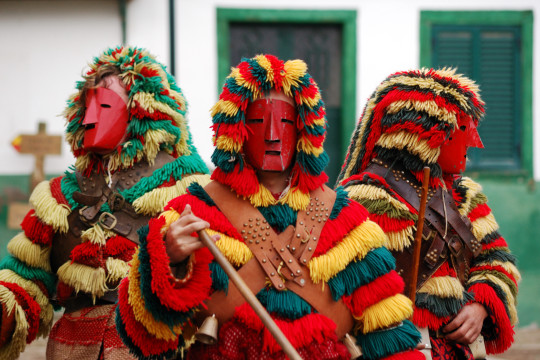
(I just think they're cool)
This was originally gonna be about multiple Carnaval traditions in Portugal, like my Halloween post, because I wanted to talk about a really beautiful festivity in my city but then I realized it was related to an entirely different holiday and I wasn't gonna scrap this idea (I'll do that one in August, I guess??). So I decided to make a post about the Caretos of Podence because I just really vibed with them.
disclaimer! None of this is from lived experience, just online research (although I tried to use sources directly related to it, specifically the Casa do Careto website). I am not from Trás-os-Montes at all and have little contact with this. Just like in my first cultural ramblie, this is just me trying to better connect with my own culture and sharing what I find with anyone who's interested. If you see any errors or want to add anything, feel free!! I'm always happy to learn!
Okay, but before we begin: what exactly is Carnaval?
You might have heard of Brazil's Carnaval. Portugal's is way less hardcore but still culturally important (although some brazillian-style Carnavais are celebrated here).
The actual day of Carnaval is the day before Ash Wednesday, but it usually lasts about a week or 3 days in more urban areas (Carnaval break is a real thing that schools have). The general objective is to have an all-out celebration before Lent starts because, after that, you're not supposed to celebrate until Easter rolls around.
The Caretos
The village of Podence is in the middle of Trás-os-Montes, somewhat between Mirandela and Miranda do Douro. It is mostly known for this celebration, which lasts for about a week.
The name "caretos" means something like "big faces" and comes from their very recognizable masks. They're made of either leather or metal and are meant to completely obscure the identity of the wearer. The costumes are made of rows of coloured wool and are usually made by the community. The red, yellow, and green pattern is not mandatory and it can have many different colours, but it's the most common since it's the colours of the flag. On top of the costume, they wear a lot of bells: smaller ones attached to the straps on their chest and 4 to 8 bigger cowbells tied around their waist.
During the celebration, the caretos dance through the town, accompanied by the jingling of their bells. Traditionally, the caretos were young men who chased after single women, but today anyone can wear the costume and chase after anyone they please. They also go around stealing any easily grabbable chorizos left hanging from smokehouses, and use wooden staffs to propel their jumps higher.
On the last day of Carnaval, the Entrudo (a giant figure of a man) is burnt to draw away the bad things of the old year and let in the next. Like this:
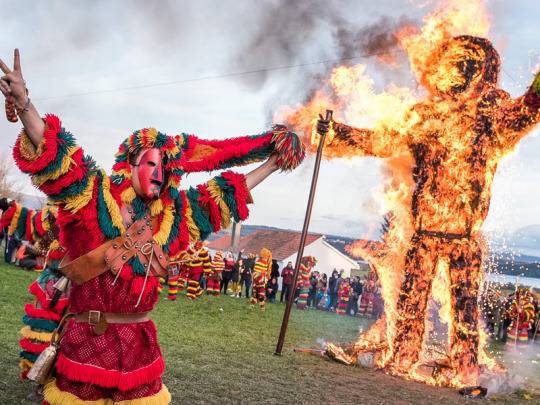
This celebration has pagan roots, although none really know exactly where its origins lie. People seem to point to it being a pre-roman festivity, but we have few sources to go from. The most probable explanation is that it was a fertility ritual connected to the agricultural cycle, since this is generally the time in which farmers can start planting again after the winter.
I hope you enjoyed this little ramble. Because I very much did. Here's some more pictures:
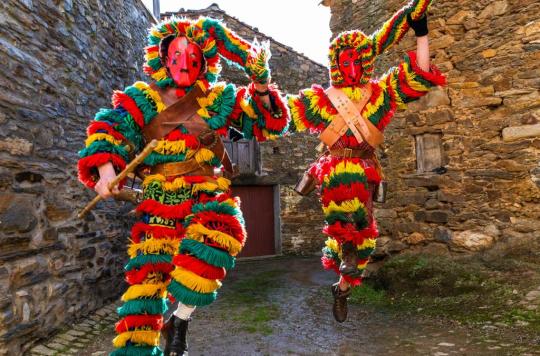
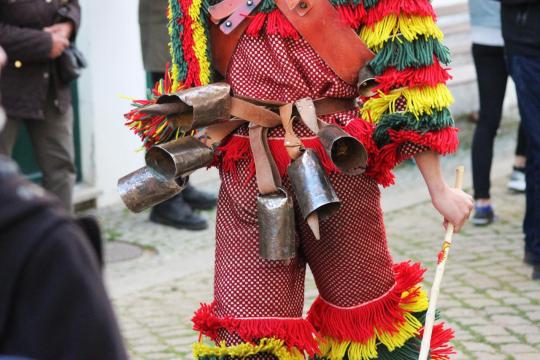
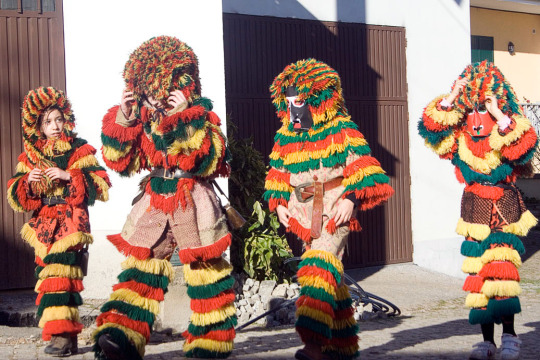
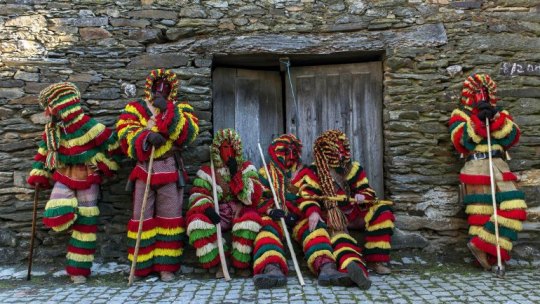
#fun fact: they made a board game about this#a thing i've never seen but DESPERATELY want to see a Careto do is a body wave#i know that costume is gonna look soooo satisfying doing that#and sound satisfying too tbh. like those cylinder thingies at the carwash.#i've never gone to see the Caretos bc i'm broke as hell but i want to someday#i have another cultural ramblie planned for tomorrow btw!! it's gonna be kinda different but still cool#happy carnaval#portugal ramblies#portuguese tradition#caretos de podence#portuguese folklore#idk how common carnaval is or isn't in other countries. sorry if the intro was kinda bad in that regard
13 notes
·
View notes
Text
Every Jewish community has their answer to the ultimate Jewish sausage. From the Portuguese Alheira de Mirandela to Ashkenazi kishke to Manhattan’s kosher hot dog, the origins of the following sausages are as diverse as their flavors.
So what makes a sausage Jewish? (No smutty jokes, please.) Well, some were created by Jews, and some are so beloved by the Jewish kitchen that they were transformed beyond their original role. Either way, start taking notes for your next barbecue.
5 notes
·
View notes
Note
explodam com mirandela não tou a brincar
Que é que mirandela fez, tem alheiras tão boas
2 notes
·
View notes
Text

Feinste Antipasti aus Tradition bei Mirandela Feinkost
Entdecken Sie die authentischen Geschmackswelten der mediterranen Küche mit den erlesenen Antipasti von Mirandela Feinkost. Unsere Spezialitäten werden sorgfältig ausgewählt und mit höchsten Qualitätsstandards hergestellt. Von gefüllten Oliven bis zu marinierten Artischocken – jedes Produkt erzählt die Geschichte italienischer Tradition und Leidenschaft.
1 note
·
View note
Text
Suspensos trabalhos de prospeção mineira de lítio em Boticas
A Savannah Resources confirmou esta quinta-feira que já foi notificada da providência cautelar contra a servidão administrativa que lhe permitia fazer prospeção mineira de lítio em Boticas, tendo interrompido os trabalhos.

"Confirmamos que fomos notificados da providência cautelar. Já a esperávamos e com normalidade a acatamos. As equipas no terreno pararam já temporariamente o trabalho que têm vindo a fazer nos últimos dois meses, estando hoje apenas a fazer manobras de segurança", pode ler-se numa resposta da empresa à agência Lusa.
Na mesma resposta, a Savannah refere que "a providência cautelar é um direito estabelecido na lei, tal como as suas consequências para todos".
"Com serenidade, trataremos este processo como os tantos outros já intentados pelo mesmo grupo opositor, e esperamos regressar ao trabalho rapidamente", conclui a resposta.
Em causa está uma providência cautelar interposta por proprietários contra o Ministério do Ambiente que suspendeu a servidão administrativa que permitia à Savannah Resources fazer prospeções mineiras em terrenos de aldeias de Boticas, foi anunciado esta quinta-feira.
A providência cautelar foi entregue no Tribunal Administrativo e Fiscal de Mirandela e, em comunicado, a associação Unidos em Defesa de Covas de Barroso (UDCB) explica que o "despacho de admissão suspende todos os trabalhos na área de servidão até decisão futura do tribunal".
A UDCB disse que esta decisão é tomada ao abrigo do artigo 128.º do Código de Processo nos Tribunais Administrativos (CPTA).
A secretária de Estado da Energia, Maria João Pereira, emitiu um despacho, publicado em 06 de dezembro em Diário da República, que autoriza a constituição de servidão administrativa, pelo prazo de um ano, o que permite à empresa Savannah aceder a terrenos privados para a prospeção de lítio.
Esta decisão foi contestada por proprietários afetados e autarcas.
0 notes


